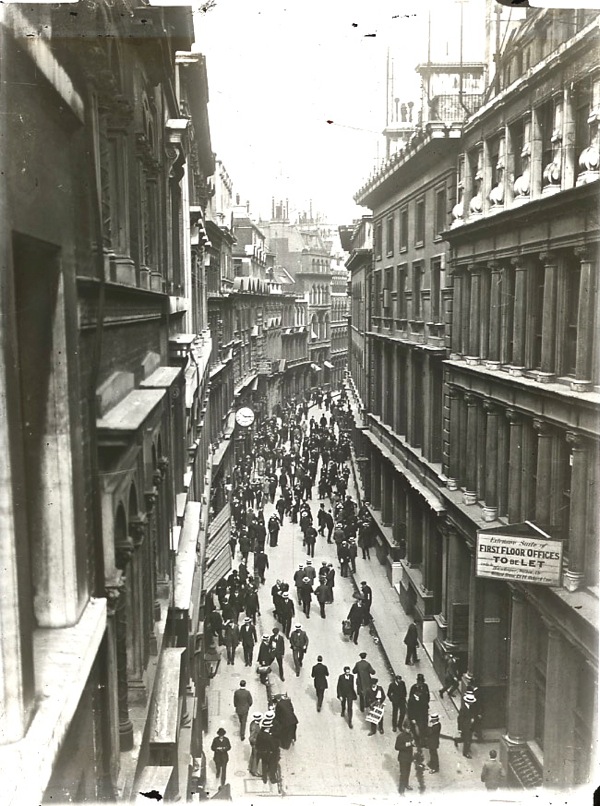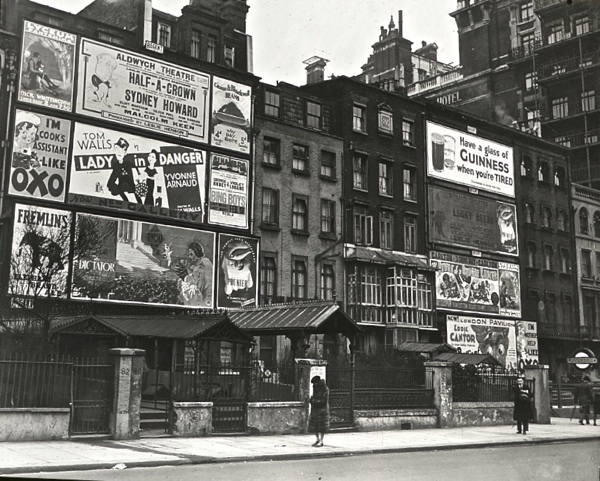The Streets Of Old London
Piccadilly, c. 1900
In my mind, I live in old London as much as I live in the contemporary London of here and now. Maybe I have spent too much time looking at photographs of old London – such as these glass slides once used for magic lantern shows by the London & Middlesex Archaeological Society at the Bishopsgate Institute?
Old London exists to me through photography almost as vividly as if I had actual memory of a century ago. Consequently, when I walk through the streets of London today, I am especially aware of the locations that have changed little over this time. And, in my mind’s eye, these streets of old London are peopled by the inhabitants of the photographs.
Yet I am not haunted by the past, rather it is as if we Londoners in the insubstantial present are the fleeting spirits while – thanks to photography – those people of a century ago occupy these streets of old London eternally. The pictures have frozen their world forever and, walking in these same streets today, my experience can sometimes be akin to that of a visitor exploring the backlot of a film studio long after the actors have gone.
I recall my terror at the incomprehensible nature of London when I first visited the great metropolis from my small city in the provinces. But now I have lived here long enough to have lost that diabolic London I first encountered in which many of the great buildings were black, still coated with soot from the days of coal fires.
Reaching beyond my limited period of residence in the capital, these photographs of the streets of old London reveal a deeper perspective in time, setting my own experience in proportion and allowing me to feel part of the continuum of the ever-changing city.
Ludgate Hill, c. 1920
Holborn Viaduct, c. 1910
Trinity Almshouses, Mile End Rd, c. 1920
Throgmorton St, c. 1920
Highgate Forge, Highgate High St, 1900
Bangor St, Kensington, c. 1900
Ludgate Hill, c. 1910
Walls Ice Cream Vendor, c. 1920
Ludgate Hill, c. 1910
Strand Yard, Highgate, 1900
 Eyre St Hill, Little Italy, c. 1890
Eyre St Hill, Little Italy, c. 1890
Muffin man, c. 1910
Seven Dials, c. 19o0
Fetter Lane, c. 1910
Piccadilly Circus, c. 1900
St Clement Danes, c. 1910
Hoardings in Knightsbridge, c. 1935
Wych St, c.1890
Dustcart, c. 1910
At the foot of the Monument, c. 1900
 Pageantmaster Court, Ludgate Hill, c. 1930
Pageantmaster Court, Ludgate Hill, c. 1930
Holborn Circus, 1910
Cheapside, 1890
Cheapside ,1892
Cheapside with St Mary Le Bow, 1910
Regent St, 1900
Glass slides courtesy Bishopsgate Institute
You may also like to take a look at









































Ludgate Hill – Ludgate Circus. London Transport Museum: the bridge completely obstructed the view along Ludgate Hill to St Paul’s. It was used throughout the 20th century until it was demolished in 1990. In actuality, St. Paul’s only starts to come into full view as we pass Old Bailey up there on the left its view from back down the road still obstructed by the buildings here jutting out into Ludgate Hill from the left. This railway bridge signalled to me in my mind I was leaving / entering Fleet Street.
That view of Holborn Viaduct exists to this day. The corner there front and left no longer exists and that wonderful building behind to the right has succumbed to that creeping plague of ghastly facadism.
It seems to me something has been lost that I see captured in these black and white – that sense of width from side-to-side in front of Holborn Viaduct. It’s somewhat ‘lost and diminished’ when viewed in Google Street View though we do have the magnificence of that real sense of colourful detail as we walk up to and beneath its portals.
Lookout for the steps to take us up to the viaduct itself where we have the Winged Lion and Agriculture statues one side and the Sir Hugh Myddleton, Science and Fine Art statues the other, not to forget the Winged Lions abutting each end on both sides.
Visit early or late in the day, close our eyes and sense those people of a century ago occupying these streets of old London eternally.
What a lovely entry, thank you.
I to see London as it was when I go for a day out down memory lane (London born and bread)
Splendid old photographs, I could look at them for hours but I am at work!
I have this lovely blog sent to my work email and private ,and start my day every day reading them, have done for a good few years now, Keep them coming and thanks so much for your dedication.
all the very best
Mark
May I echo George Kearse and say how much I appreciate that view of the Ludgate railway bridge for revealing that there are actually six giant girders side-by-side. Who would have guessed more than two?
Greetings from Boston [USA]:
Like many others, I’m sure, I have often been so distressed by the “satanic” discoloration
of London street scenes by coal dust that my view of your beloved city has been more or less obscure.
I am thrilled to see these glass-lantern slides — images so brisk and clear and just loaded with
detail. So many thanks.
I have an unkind thought about the façades. Should cataclysm strike, they will lie in ruins and the
Old London will re-emerge.
Hard to express — but I’ll try. This morning I am thinking how fortunate I was to discover
Spitalfields Life. GA, you have gifted us, the readers, with your ability to time travel and to experience this magnificent city as it once was. (by the way, it fascinates me that some people would actually prefer to go into the future, rather than return to the past. I’m astounded by that!)
Each one of these photos was replete with endless telling details, and mythic stories. I could
happily examine the top photo for hours. “Rollicking” is the word that comes to mind. It is
chock-a-block with people, conveyances, awnings, signage, umbrellas (!), hats, wheels, horses, windows, hand rails (notice those beautiful undulating curves) and more. I imagine………….noise. The heartbeat of a city, captured in a photo. (Wouldn’t you love to see the photographer, atop a bus, TAKING the photo? In all the hubbub, he has not attracted any attention to himself, and no one has turned to look. Well-done, sir!)
This is the London I would like to explore.
With a good supply of pounds, shilling and pence and late twentieth century quality condoms, one could have some great times on those streets. The metropolis.
Then click your fingers and return to the present.
Good times, super pics.
You nailed it saying you walk around the old streets! So do I! I look at a lot of old streets and then have to go and visit to see the difference! My biggest shock of the photos were Regent Street!!!! Can you imagine it looking like that now? ❤️
Amazing images, and ones I have so many connections with, not least the first one of Ludgate Hill where my late husband worked in an office there.